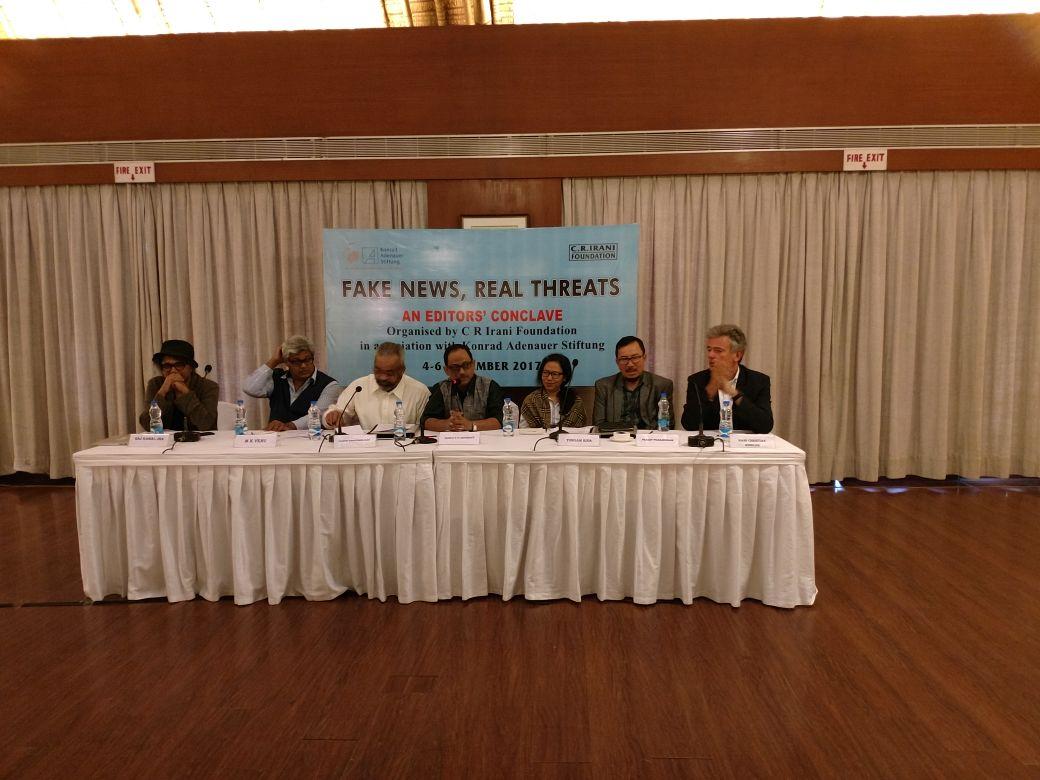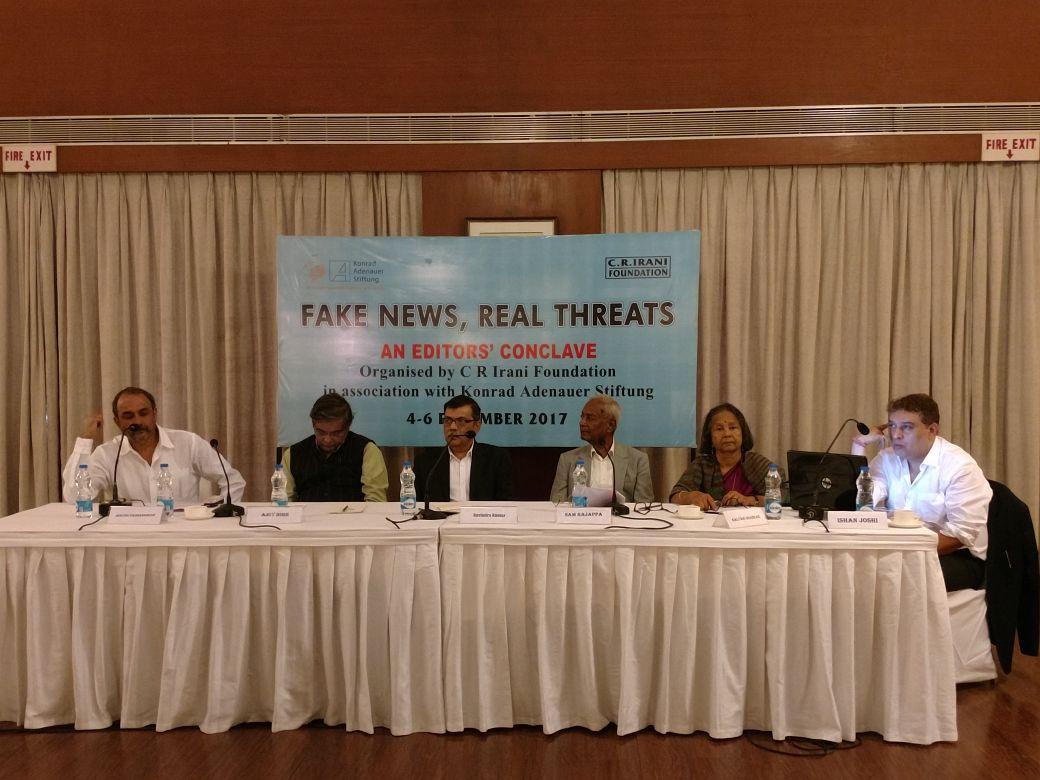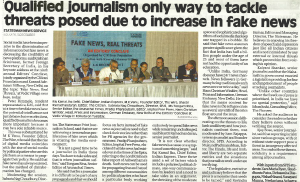Event reports
As part of the annual Editors' Conclave, students of the SPJS and NUJS had the opportunity to informally exchange views with journalists and editors during the conference. In his introductory remarks, Mr. Ravindra Kumar, Trustee of the C. R. Irani Foundation, took recourse to the history of the Editors' Conclave and explained that with the attendance of the students of SPJS and law students, young people get the chance to get to know the current topics and challenges of modern journalism.
In his welcome remarks, Mr. Peter Rimmele, Resident Representative of the KAS in India, pointed out the special role of journalism in times of "fake news". He said that journalism is extremely important as it can be the only reliable source of information. Mr. Rimmele also spoke about the murder of several journalists in India bringing to fore that India's journalism was threatened not only virtually, but also in real terms.
In his keynote speech, former Foreign Secretary of India, Ambassador Krishnan Srinivasan discussed in a Tour d'Horizon the history of "fake news", the challenges posed by social media and the current discussion on abolishing net neutrality.
The first round of discussion dealt with the topic "Fake News". The panel discussion, chaired by Mr. Subrata Nag Choudhury, director of the SPJS, addressed questions of how "fake news" threaten the media, how it can be identified, and what motives and patterns are behind the social media driven "fake news". Mr. M. K. Venu, founding editor of “The Wire”, commented on the strategy of one of the political parties, which combined truth and falsification in its 2014 election campaign. "It is not a good time to be a journalist in India these days. You have to take sides and that is when journalism suffers," declared Ms. Tongam Rina, senior editor of the “Arunachal Times”. Mr. Pradip Phanjoubam, editor of the “Imphal Free Press”, said that there had always been fake news and provided as an example the fake news of Ashwathama's death by Lord Krishna. "Fake News" is currently being used by political parties to promote fear and hatred between communities for the benefit of themselves, senior journalist Mr. Shastri Ramachandaran said. "It is not clear whether fake news is a cause or a symptom of something larger," explained Mr. Raj Kamal Jha, chief editor of “The Indian Express”. These thrive amid a set of factors which include a polarized political climate, one-way communication by leaders and a need to take sides in an argument, the shrinking of the moderate space and sophisticated algorithms of social media that keep one trapped in a bubble. He advocated a stronger education of the youth, so that they would be able to unveil “fake news”. Mr. Hans Christian Winkler, Head of the Press Department of the German Embassy in New Delhi, reported on the phenomenon from a German perspective. He articulated that in Germany, the main source for the distribution of “fake news” is Facebook and that especially about refugees much "fake news" are spread.
The second round of discussion was chaired by Mr. Sam Rajappa, journalist and founding director of the SPJS, and was dedicated to the threats to freedom, life and limb. According to Mr. Mukund Padmanabhan, editor of "The Hindu", journalists in particular are currently under particular pressure from the government and have to work in an increasingly radicalized environment. "The legislative, executive and judiciary believe that the press is a monster that needs to be tamed," Mr. Ravindra Kumar said. Ms. Kalyani Shankar, senior journalist, pointed out that the Government of Maharashtra had enacted a law to give better protection to journalists. "Unlike other countries where the freedom of press is prioritized, in India we have no special protection," said Mr. Ishan Joshi, consulting editor of “The Pioneer”. Mr. Ajoy Bose, senior journalist, explained that reporting is risky since various groups, with or without state support, pose a threat in insurgency affected areas. To combat these threats, solidarity is a requirement among all journalists.
The third session, which was chaired by Professor Ankita Chakravorty, NUJS, focused on the question of how to deal with the challenges discussed in the previous sessions. Quite self-critical, the journalists and editors pointed to their own responsibility. Accordingly, the media today would be under pressure to report real news, as much has been disseminated in advance through social media. The task of journalism is to produce an added value. The most important question must always be why a message is important and relevant. The current criticism of modern journalism must also be perceived as an incentive for a better journalism. At the same time, however, the readership was responsible for not believing every message and had to deal critically with news. Mr. Raj Kamal Jha concluded: “Let’s not let the worst of journalism define our mission. The biggest challenge today is to have a newsroom with journalists who have the talent and commitment needed to tackle new challenges each day. We have to bring into journalism the rigor and depth of the best of academia. Journalism is about holding power to account through storytelling and should to constantly reclaim that role.”
The final panel discussion was conducted by the students from SPJS and NUJS, who gave their personal perspectives on the conference with respect to the issues raised. The extent to which "fake news" could be countered by the law and to what extent it is covered by freedom of expression was discussed in particular. The students stated that the fight against "fake news" is not primarily a legal issue, but it is a common task of the media, the state and the citizens to prevent it from turning into a societal epidemic.





